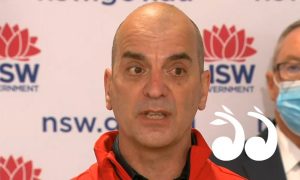Covid-19 in ICU explained
AT today’s NSW Health media conference, Dr Richard Totaro, head of intensive care at Royal Prince Alfred explained the impact of Covid-19 on intensive care units and caring for patients with Covid-19.
“There’s a lot of focus on cases and case numbers across the state..the thing about the case numbers is that eventually those cases funnel into the ICU,” said Dr Totaro.
“ICUs across the state are a relatively limited resource, they’re usually quite full and the ICUs are really the centre of hospitals, it allows us to do things like heart surgery, complex obstetrics, it allows us to look after patients who’ve had multiple trauma, it allows us to eh leukemia treatments, the whole variety of things need access to the intensive care unit,” he said.

Dr Richard Totaro, Head of Intensive Care at Royal Prince Alfred explains the pressure of Covid in ICU.
“This disease is a disease where a small number of people who get sick end up in the intensive care unit and they stay in the ICU quite a long time; normally patients in the ICU are there for three or four days on average, patients who have covid who end up on ventilators, on the breathing machine, the life support, stay in ICU from the UK data something like three weeks.
“If you’re in the ICU, you’re on life support and you’re on dialysis, you stay in the ICU somewhere around five weeks.
“So you can see how a unit which is designed to have patients coming through, at high numbers, lots of through put, all of a sudden these patients come in, they slow the flow down, they slow everything down, it makes the unit slowly fill up.
“We’ve got access to ICUs at the moment in Sydney, lots of room, ICUs are a combination of a very complicated bed, lots of infrastructure, machines, but much more importantly than that ICUs are built around intensive care and the intensive carers are the nurses.
“Our nurses are absolutely vital in providing the technical skills of looking after the machines, are vital to looking after the patient and the recognising when they’re getting sick, when they are getting better and also providing compassionate care to the patient when they are having the worst time of their lives and the patient’s families.
“Covid has really changed how we deal with families, we can’t have face to face meetings, we have to this digitally and it really adds an extra layer of complexity
“Looking after covid patients is really demanding you wear layers of PPE, which is hot particularly for the nurses, it’s difficult work, it’s physical work.
“For the medical staff if you’re doing procedures, if you’re doing operations on these patients, you’ve got the PPE and sterile equipment over the top of that, it can be very difficult work and these are really sick patients.
“So what we want to do is take these patients who are really sick and stop having them, we want stop people getting sick and then getting up in an ICU and there is really good evidence from all over the world that the vaccinations that we have available to us stop people, once they are vaccinated, needing to come into hospital, almost all the hospitalisation goes away, almost all the need for ICU goes away and almost all the death goes away once people have been vaccinated properly.
“And that’s what we want to see, you take this disease, which in older people 10 to 20 percent end up in ICU and you make it a much more mild disease; a disease that can be managed as outpatients, that can be managed with health and so on, rather than burdening the hospital’s, over running hospitals,” he said.
“And we know from having looked around the world that when hospitals are over-burdened, when they are running at over-capacity, more people die than would have otherwise,” Dr Richard Totaro said.
Dr Kerry Chant, chief medical health officer, said the key message is, ” get vaccinated, we do not want to see anyone in ICU and we have the tools to prevent you going to ICU and that’s getting vaccinated and I don’t think we’ve seen anyone who’s had the two doses of vaccine in ICU and I think it’s really critical for people to go out and get vaccinated.”
Dr Totaro agreed, “for us the really striking thing is that we haven’t seen anyone who’s had two vaccines…come to the ICU and need to be with us, nobody on ventilators with two vaccines, nobody on ECMO (Extracorporeal Membrane Oxygenation), nobody in the ICU after having had two vaccines and if people get themselves vaccinated they are helping themselves, you’ll stop yourself getting sick and you’re going to stop you family, your loved ones the people around you getting sick, because they won’t get it from you and you’re going to help the whole community because one the higher the vaccination rate we have the less people are getting sick and two then we can go back to having our lives that we before, so getting everybody vaccinated, older people, young people absolutely have to go out and get vaccinated, that’s are really important thing for us.”
He also confirmed, “We have people who are physically fit and well and who don’t have underlying conditions.”
Tags: Coronavirus, Covid-19, Dr Richard Totaro, ICU, Pandemic, RPA
 scone.com.au
scone.com.au